There is a very wide range of understandings in church and society – and among historians too – about the precise meaning and implications of the Treaty of Waitangi/Te Tiriti o Waitangi. The Treaty Principles Bill is highly political and has stirred up a great many Māori. Some of the rhetoric on the extremes of both sides has been unhelpful. We can thank God, though, that the very large hikoi was so peaceful, as promised.
New Zealand Christian Network, as a Christian unity movement, must of course be politically non-aligned. But we suggest that as Christians most of us can probably agree that:
- the background to the Treaty/Te Tiriti was Christian humanitarian concern to protect Māori from the harmful effects of uncontrolled colonial settlement and injustice
- Māori signed the Treaty/Te Tiriti in good faith, trusting the missionary assurances that the British Crown would govern with justice
- in Article 1 of the Treaty/Te Tiriti, Māori agreed to governance by the Crown
- in Article 2, the Crown guaranteed to Māori chiefs (and by implication their people) the retention of the rights they already had, including tino rangatiratanga (chiefly mana and self-determination), and their lands, fisheries, and treasures
- in Article 3, the Crown gave Māori the same rights and privileges as British citizens – another guarantee to Māori that they would be protected in law by the British Crown, rather than subjugated and treated as less than equal
- many Māori came to see the Treaty/Te Tiriti as akin to a sacred covenant between themselves and the Crown
- the Treaty/Te Tiriti was significantly breached by the Crown, as the colonial government bowed to pressure from land-hungry settlers, and as New Zealand became numerically and culturally dominated by Pākehā
- as Christians we recognise the importance of justice and redress
- as Christians we utterly reject any form of racism, from any quarter
- as Christians we recognise both the intrinsic equality of all human beings and also respect cultural distinctives
- as Christians we honour the unique provisions of the Treaty/Te Tiriti
- as Christians we should be committed to inter-cultural reconciliation, respect, and aroha
Christians making submissions on this (or any other) Bill
It can be a bit frustrating making a submission on a parliamentary Bill, as the outcomes of the Select Committee process can often appear largely politically pre-determined.
It is still good, however, for some Christians to speak up on legislative issues that have spiritual and ethical implications, and make written and even in-person submissions. We live in a democracy, and Christians have both a right and a responsibility to advocate for what we believe is right and express our cautions against what we believe is wrong. We do so because we care for the common good, and because Christian perspectives – which will vary – need to be part of the mix.
If as Christians we do speak up, we need to do so in a way that commends rather than discredits our Christian faith and values. We need to communicate with truth and love, respect and humility, and sound reasoning, and not with rancour or hostility. Over the years, many Christians have made excellent submissions on a great number of important issues.









0 Comments